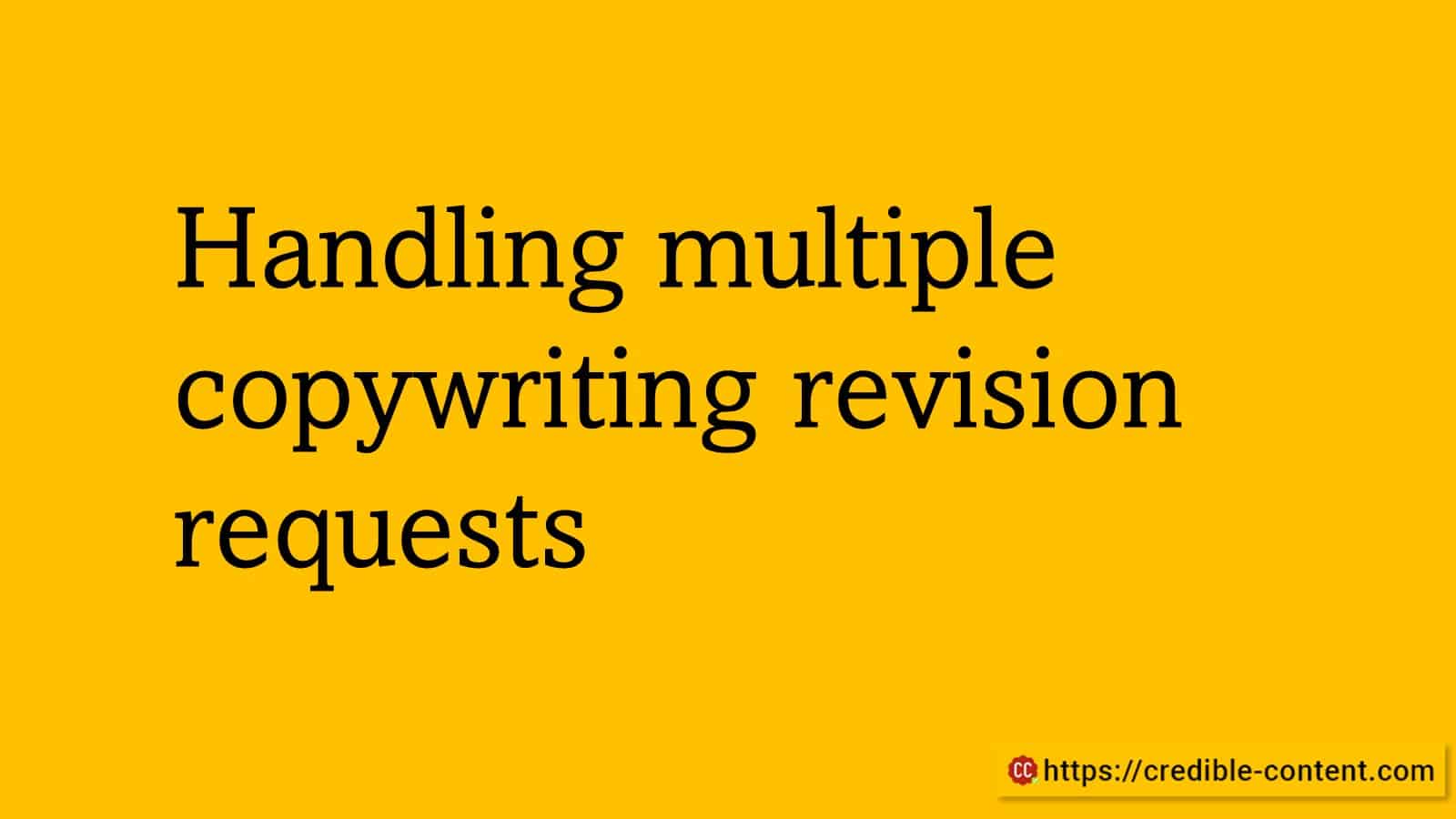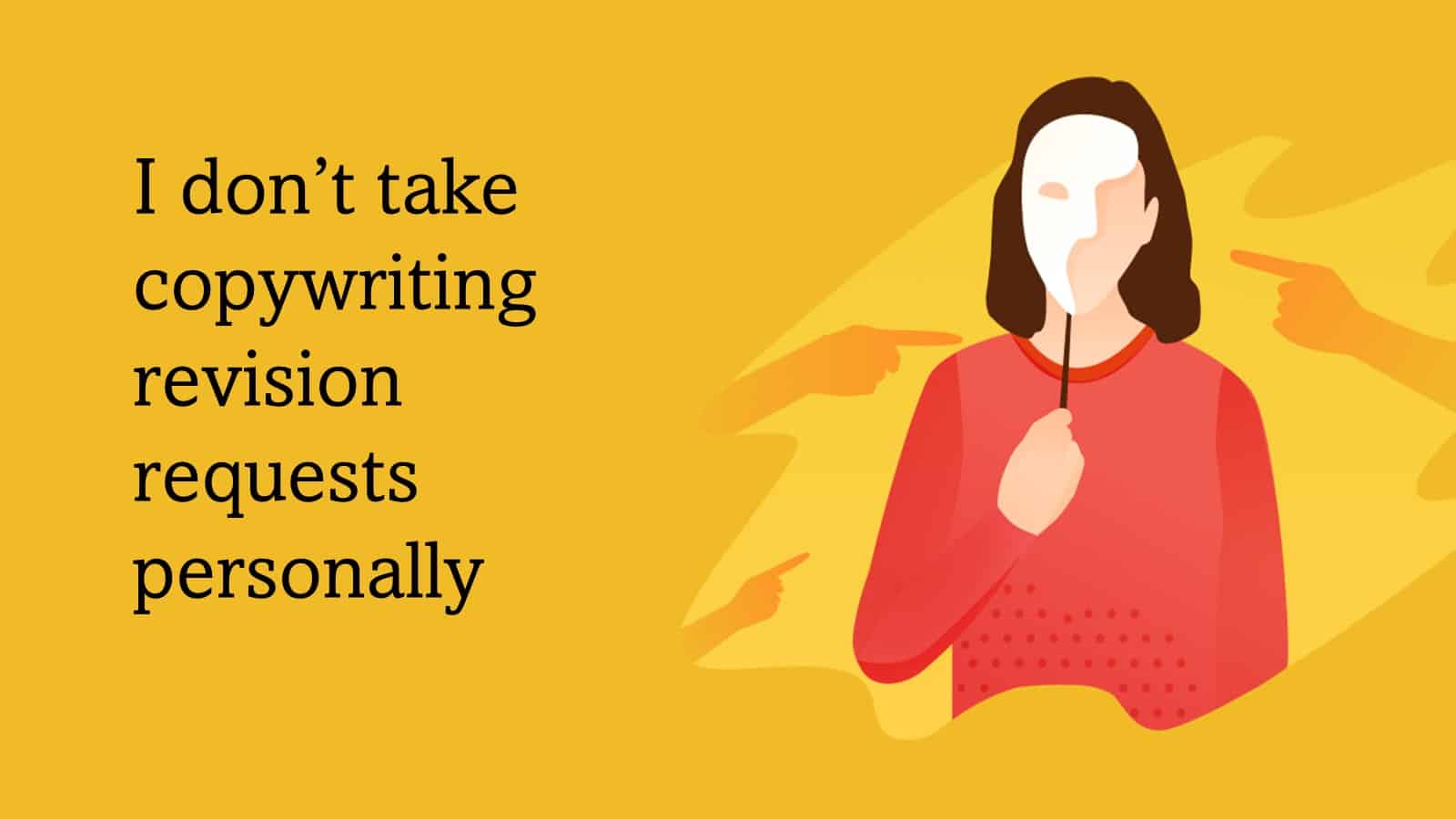Whenever I’m negotiating a new project, I want to put my client at ease by telling them that I offer unlimited revisions.
With that, I quickly add that no client in their right mind would want to unnecessarily delay their projects by repeatedly getting their copy revised.
Yes, I actually use the phrase “no client in their right mind”.
How often do I get clients who get in that revision spin and the project never seems to end, wasting my time in the process without making me extra money?
It doesn’t happen often so I’m not worried if once or twice a year I get to work with such a client.
Most of the clients come with a clear objective: they want to increase their sales or want a better KPI for their upcoming campaign.
Most of the copywriting clients respect my time and are even ready to pay more if I need to spend extra time researching and reading their material.
You may like to read: My content writing process for different niches
How do I handle multiple copywriting revision requests
When I submit the first draft, I expect the client to give me some feedback.
Statistically, 2/5 clients ask for a revision.
Most of the clients are satisfied with the first draft.
In most of the cases, even when they request a revision, it is merely some factual information that needs to be changed – they didn’t either provide the information in the beginning, or I misunderstood.
Sometimes the client simply wants me to make some changes that they could have made themselves but somehow, they have this mentality that if they are making me write, even if they want to add a single phrase, they add it in the comments section of Google Docs instead of making changes within the copy.
I find it annoying, but I don’t take it personally and neither ask the client to make the changes on their own.
I make those changes.
If it takes me 5-10 minutes to change the document even when it was not my mistake and I was given wrong information or the client didn’t properly explain what needed to be said, I revise the document without charging extra or without complaining.
Even if the client completely doesn’t like what I have written I gladly submit the second draft.
If they don’t like the second draft too, I politely reimburse the advance that I have taken and wash my hands off the project.
I would like to stress that it happens only when, for example, I have written 1000 words and out of those 1000 words, the client doesn’t like more than 500 words of text.
Here are the reasons why this may happen:
- I’m not able to understand properly what the client wants.
- The client doesn’t like my writing style.
For the first reason, I try to understand again.
I ask for more information.
I reconfirm the information I have.
I revisit the example websites the client shared with me in the beginning of the project.
Then I revise the document.
What about the second reason?
I have a certain writing style.
People either like it, or they don’t like it.
Many clients hire me for my particular writing style.
Although I can adopt a different writing style for different industries, my basic writing style remains the same.
For example, an accounting business may require a writing style that is completely different from a tech startup, but even then, my underlying way of communicating remains the same.
The language may change, the phraseology may change, but the style remains the same.
Hence, for the second draft, I try to vary the style, but even after that if the client is unsatisfied, I tell the client that I won’t be able to continue.
So what about that “unlimited revisions” claim that I make in the beginning of our negotiations?
I act on my gut feeling.
I have enough experience by now to know if the problem lies with me or with the client.
If I feel that somehow, I’m not able to get what the client wants and there is no problem from the client side, I offer limitless revisions. I go on revising the document if it is logically possible for me.
Do I take copywriting revision requests personally?
In most of the cases, I don’t.
Recently I did.
A so-called life coach approached me to write content for his website.
Why I say “so-called”?
Because his language was quite negative and being a writer, I judge a person by the way he or she communicates.
If he couldn’t use constructive language with me, I wonder what sort of language he used with people who use his coaching services.
Anyway, when I submitted my first copy, his first reaction was, “This is horrible writing, I’m completely disappointed.”
That’s it.
I had written his content with lots of love and care because one, I love writing content for life coaches, and two, in the past 17 years I must have written for at least 20 life coaches, to their great satisfaction.
In fact, I sent him 5 life coaching websites for which I have previously written content and he had agreed to work with me only when he had liked my writing style on those websites.
After coming out of my initial shock, I responded with, “Kindly let me know in what sense the writing is horrible? Is it the sentence structure? Is it my vocabulary?”
“I’m just not getting the right feeling, please rewrite it completely,” he responded.
Again, since I like writing for life coaching websites, I wanted to satisfy him and rewrote the entire web page.
He said it was worse than the previous version, again, not giving a single example of why he found it unacceptable.
I again wrote and he responded with a “It’s fine now.”
Learning from my recent experience, I wrote the next page just the way I had written the previous page but of course, with new, relevant information.
“It seems you haven’t even understood my requirement,” he responded, after going through the second page.
I rewrote the page. He accepted it.
The same pattern for the next two pages.
The moment I had finished work equivalent to the advance that I had taken, I told him there was no synergy between us and I won’t be able to continue.
By that time he had mellowed down and suggested that we tried a couple of more pages, but by that time, I was emotionally exhausted and I refused to continue.
Such incidents happen every 2-3 years and since they’re not regular, I don’t find them discouraging.
Other than that, whenever a client suggests revisions, I gladly implement them.
After all, the client is the expert in their field. For example, a lawyer knows more about the law than I do.
Since I’m not a subject matter expert and I write content and copy based on the information that I can find or the information I have been given, I’m bound to make certain points or misinterpret certain concepts.
Hence, when the client asks for revision, I gladly provide.



